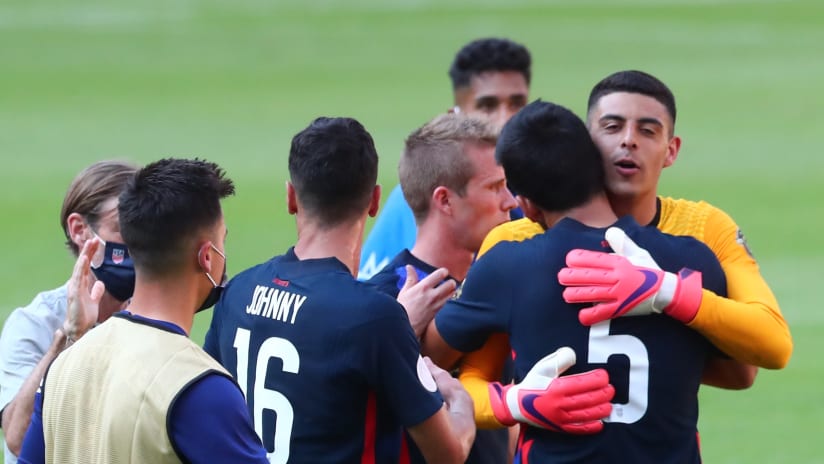First things first: There’s no substitute for victory, period.
When you’re staring at a must-win opening game with a 12-year Olympic qualifying drought hanging over your head, three points is the only acceptable outcome, and the US Under-23 men’s national team got it done against Costa Rica at Estadio Jalisco on Thursday.
The win gives the US the edge on their main rival for advancement out of Group A, alongside Mexico, and puts them on course for a successful tournament. That said, they did it in just about the most arduous, agonizing fashion imaginable, allowing Jesus Ferreira’s vital early goal to become a crutch that they leaned on more and more heavily as the 90-degree Guadalajara evening unfolded.
OK, correction – the young Yanks also did some heavy reclining on the willing back of goalkeeper David Ochoa, the fourth-youngest player on their roster and a surprise starter considering that his San Jose Earthquakes counterpart JT Marcinkowski had for some time been expected to be the No. 1. Without Ochoa’s whopping nine saves – a couple of them denying clear, inviting Tico looks at goal – the United States would’ve been stranded as they wilted under the warm Mexican sun.
“It wasn't great,” admitted coach Jason Kreis in his postgame press conference. “It was an important result for us but I would say that we would have hoped to have gotten that result in a little bit of a better fashion. I think we would have hoped that we could have been better on the ball and made better decisions and maintained the tempo of the game better.”
With a dominantly MLS-based squad and the league starting its 2021 six weeks later than usual, most of Kreis’ players haven’t put on a match kit in months, and it showed, though sooner for some than others. Add in the usual big-game jitters and an ambitious pass-and-press tactical blueprint handed down from the senior USMNT, and you had a recipe for tension, and a long, slow fade as gas tanks steadily ran dry for the team in blue.
“Without a doubt, I think that the system that we're playing is a very difficult one, it requires a lot of energy, it requires a lot of running, it requires the players to be calm on the ball,” said Kreis. “It's not easy to be a team that's looking to build out of the back or maintain possession of the game, this isn't the easy way to play. The easy way to play is to be reactive and counterattack. But again, it's not our DNA and ultimately we're going to continue forward with this identity.”
Multiple generations of US transition aces like Cobi Jones and Landon Donovan might take issue with that bit about DNA, and Costa Rica would (and did) point to the match statistics that showed them to be superior in passing, possession, shooting and pretty much every other category except the final score.
But whether it was their plan all along or not, Kreis’ side burst out of the gates with more intensity from the opening kickoff – Ferreira could easily have had a first-half hat trick, hitting the post and flubbing a 1v1 with Ticos ‘keeper Kevin Chamorro – and the advantage that it carved out for them was ultimately, barely enough.
Kreis has made clear that he embraces an assertive, pass-happy philosophy just as much as senior side boss Gregg Berhalter does. But that imposes a smaller margin for error in high-stakes tournament settings like this one and his players shrank it further with some slack passing and excessively casual buildouts, forcing them to bear down, bleed the clock and ride their luck.
“It's not surprising to me, because we were asking our team to build up. I think it may have been a different affair if we would have just said OK, every goal kick we get we're going to take long, we're going to push into the opponent's half and fight for second balls, but that's not part of our DNA,” asserted Kreis. “That's not who we are. And so we asked to build up. The majority of the shakiness that I saw came through just mistakes in buildup. So again, I think that's just a footballing issue.
“Part of guys not playing matches is that it's not just about fitness, it's also about their touch on the ball. So I felt that the majority of what Costa Rica did to hurt us was in transition, when we gave the ball away very cheaply.”
Which leads us back to arguably the most enduring, influential meta-question facing the USMNT in this century: How to sustain the quest for a more sophisticated mastery of progressive play without losing the gutsy, tenacious defiance of old? Berhalter and Kreis’ predecessors wrestled with it, and now it sits squarely on their plates, too.
There will be more time and bandwidth for all involved to address that in the months ahead, once passage to the Tokyo Olympics (and eventually, World Cup 2022) is attained. First these U-23s have to reach this month’s tournament final, and though they at times looked like your uncle’s creaky Volvo station wagon with just enough change in the ashtray to fill 'er up, they made it to their first milepost.














